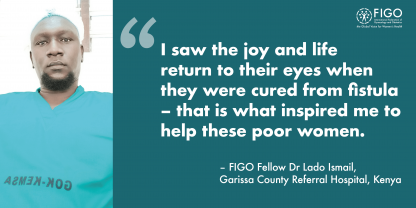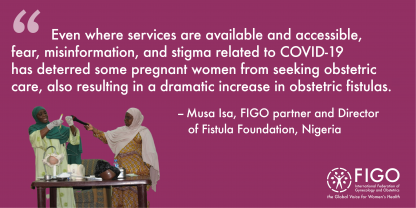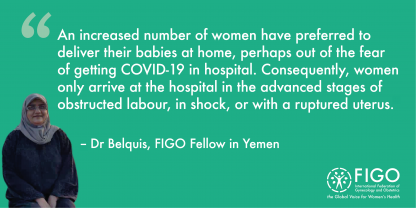Stories from FIGO's Fistula Fellows – DRC

Obstetric fistula is a neglected public health and human rights issue, and a devastating childbirth injury. It leaves women permanently incontinent and it is currently estimated that only 1 woman in 50 is able to access corrective treatment.
The FIGO Fistula Surgery Training Initiative is a globally recognised, pioneering programme offering training and education in fistula surgery. Our 67 trainee surgeons – ‘FIGO Fellows’ – provide life-transforming care in some of the world’s most underserved regions, thereby helping to close the fistula treatment gap.
This month, we spoke to FIGO Fellow Dr Claude Idring’i Malasi from Centre Hospitalier de Rwankole in Bunia, the Democratic Republic of the Congo, about his experience of being a fistula surgeon and what it will take to eradicate fistula by 2030.
I was inspired to do fistula surgery by Dr Christina Dewind, a Dutch surgeon based in Kampala, Uganda, who used to visit every year to repair fistulas in my hospital in Rwankole, Bunia. The smiles on the faces of women who received surgery and were cured of their fistulas encouraged me greatly to learn and practice this type of surgery.
A patient's story
A memorable story is that of Thérèse, aged 46, who received surgery four years ago for a 1.5 cm diameter mid-vaginal fistula. She developed the fistula at the age of 16 during her first (home) delivery and lived miserably, alone because of her condition. As she was told that fistula was an incurable condition, she never went to hospital to seek treatment. However, it only took us 45 minutes to close her fistula and give her back her smile. We were very happy with the result after the operation.
Impact of COVID-19 on fistula treatment services
The COVID-19 pandemic did not affect my work in fistula management very much, as we did not have any positive cases in our hospital. In addition, the prevalence of the virus is very low in our setting. Thus, we continued doing fistula repairs as normal throughout the year, whilst respecting the measures to prevent the spread of the disease.
We have seen an increase in new cases of fistula over the last three years. We believe that this is due to the insecurity in eastern Democratic Republic of the Congo, particularly in Ituri province, which limits the free movement of people. As a result, women cannot easily reach health facilities for emergency caesarean sections when needed.
Being a FIGO Fellow
Being a FIGO Fellow has helped me greatly in my fistula work, as I have benefited a lot from the FIGO training programme:
- I benefited from fistula surgery training at Hamlin Fistula Hospital in Addis Ababa
- I have received documentation and manuals on fistula repair
- I have been participating in the online training sessions
- I have received equipment for fistula surgery (2 surgical kits, 1 headlamp) and support for the fight against COVID-19
- Connecting with other fistula surgeons across the country and getting an idea of the evolution of fistula work around the world.
Eradicating obstetric fistula by 2030
The eradication of obstetric fistula is possible, but in my country, Democratic Republic of the Congo, there is still a long way to go to achieve the elimination of fistula, especially in the east of the country. To achieve this, we believe that peace must first be restored and then the government and its partners must put a lot of resources into preventing obstetric fistula.
23 May marked the annual International Day to End Obstetric Fistula. Help FIGO to end obstetric fistula by donating to the FIGO Fistula Surgery Initiative, as well as spreading the message on social media using our toolkit.


